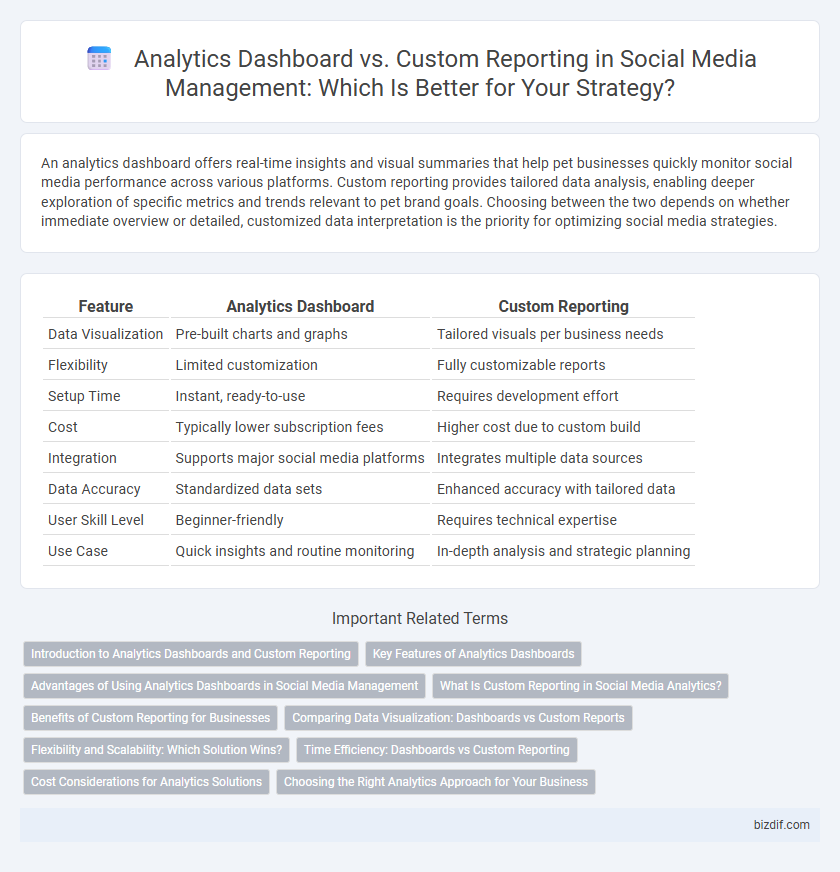An analytics dashboard offers real-time insights and visual summaries that help pet businesses quickly monitor social media performance across various platforms. Custom reporting provides tailored data analysis, enabling deeper exploration of specific metrics and trends relevant to pet brand goals. Choosing between the two depends on whether immediate overview or detailed, customized data interpretation is the priority for optimizing social media strategies.
Table of Comparison
| Feature | Analytics Dashboard | Custom Reporting |
|---|---|---|
| Data Visualization | Pre-built charts and graphs | Tailored visuals per business needs |
| Flexibility | Limited customization | Fully customizable reports |
| Setup Time | Instant, ready-to-use | Requires development effort |
| Cost | Typically lower subscription fees | Higher cost due to custom build |
| Integration | Supports major social media platforms | Integrates multiple data sources |
| Data Accuracy | Standardized data sets | Enhanced accuracy with tailored data |
| User Skill Level | Beginner-friendly | Requires technical expertise |
| Use Case | Quick insights and routine monitoring | In-depth analysis and strategic planning |
Introduction to Analytics Dashboards and Custom Reporting
Analytics dashboards offer real-time visualization of social media metrics such as engagement rates, follower growth, and content performance, enabling quick insights and data-driven decisions. Custom reporting allows for tailored data extraction and in-depth analysis based on specific campaign goals, audience segments, or timeframes, providing granular control over the presented information. Both tools enhance social media management by transforming raw data into actionable insights to optimize strategy and measure ROI effectively.
Key Features of Analytics Dashboards
Analytics dashboards offer real-time data visualization, enabling social media managers to track engagement, reach, and follower growth instantly. These dashboards integrate multiple platforms into a single interface, providing comprehensive metrics such as post performance, audience demographics, and sentiment analysis. Customizable widgets and automated reporting features enhance the ability to monitor KPIs efficiently and make data-driven decisions quickly.
Advantages of Using Analytics Dashboards in Social Media Management
Analytics dashboards in social media management offer real-time data visualization, enabling faster decision-making and more efficient campaign adjustments. These dashboards aggregate metrics such as engagement rates, follower growth, and click-through rates in one intuitive interface, reducing the need for manual data aggregation. Businesses benefit from automated alert features that highlight anomalies or trending content, improving responsiveness and overall strategy optimization.
What Is Custom Reporting in Social Media Analytics?
Custom reporting in social media analytics enables tailored data visualization and insights specific to unique business goals, unlike standard analytics dashboards that provide generic metrics. It allows marketers to select relevant KPIs, track campaign performance in real time, and generate reports that highlight ROI, audience engagement, and content effectiveness. This flexibility drives data-driven decisions by delivering precise, actionable insights beyond default dashboard capabilities.
Benefits of Custom Reporting for Businesses
Custom reporting empowers businesses to tailor social media analytics to specific goals, providing actionable insights beyond generic dashboard metrics. It enables the integration of diverse data sources, delivering comprehensive performance analysis and helping identify unique audience trends and campaign effectiveness. Businesses leverage custom reports to make data-driven decisions, optimize content strategies, and improve ROI with precise, relevant metrics aligned to their brand objectives.
Comparing Data Visualization: Dashboards vs Custom Reports
Dashboards provide real-time data visualization with interactive charts and graphs, enabling quick insights across multiple metrics. Custom reports offer tailored data presentations that focus on specific KPIs and allow in-depth analysis with personalized formatting. While dashboards prioritize overview and speed, custom reports emphasize detailed data exploration and strategic decision-making.
Flexibility and Scalability: Which Solution Wins?
Analytics dashboards offer real-time data visualization with customizable widgets, providing immediate insights for social media management, while custom reporting delivers tailored, in-depth analysis that adapts to specific business needs. Dashboards excel in flexibility by enabling quick adjustments to metrics and data sources, whereas custom reports scale more effectively to complex datasets and evolving marketing strategies. For businesses prioritizing agile performance monitoring and scalable growth, custom reporting ultimately outperforms static dashboards in long-term adaptability and comprehensive data handling.
Time Efficiency: Dashboards vs Custom Reporting
Analytics dashboards provide real-time data visualization with instant access to key social media metrics, significantly reducing the time needed for data interpretation. Custom reporting requires more time to compile and tailor data, often involving manual adjustments to meet specific needs. Prioritizing dashboards enhances time efficiency for quick decision-making, while custom reports offer depth at the cost of increased preparation time.
Cost Considerations for Analytics Solutions
Analytics dashboards offer cost-effective, real-time data visualization ideal for monitoring social media performance without extensive setup fees, while custom reporting often incurs higher expenses due to tailored data integration and advanced analytics capabilities. Businesses must evaluate budget constraints against the depth of insights required, as dashboards provide standardized metrics whereas custom reports deliver personalized, detailed analysis. Cost considerations should also include ongoing maintenance and scalability, with dashboards generally requiring less financial commitment compared to the bespoke nature of custom reporting solutions.
Choosing the Right Analytics Approach for Your Business
Selecting the right analytics approach hinges on your business goals and data complexity, where analytics dashboards provide real-time insights through visualizations ideal for quick decision-making. Custom reporting offers tailored data analysis, enabling deep dives into specific metrics essential for strategic planning and comprehensive performance tracking. Balancing these tools optimizes social media management by enhancing data-driven strategies and improving overall campaign effectiveness.
analytics dashboard vs custom reporting Infographic

 bizdif.com
bizdif.com